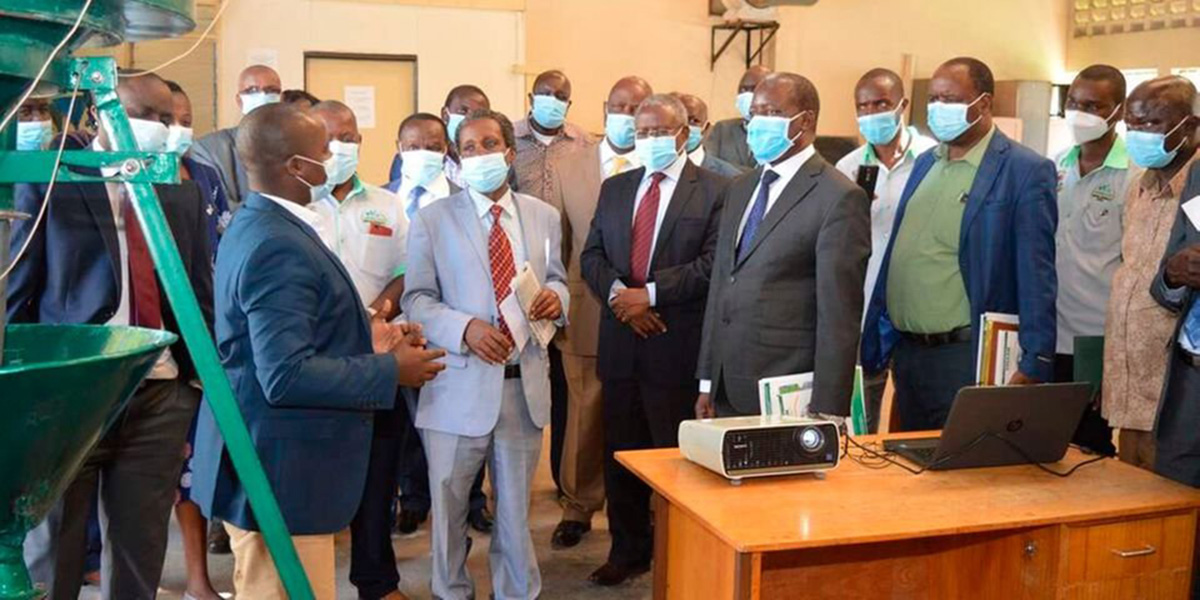
World Bank centre at Egerton is making waves in research and business
A Sh642-million project sponsored by the World Bank is making waves in the research world, having supported a total of 190 research projects that resulted in 204 publications in international peer-reviewed journals.
The centre has supported 240 graduate students--168 who studied for master’s degrees and 72 doctorate students.
The Centre of Excellence in Sustainable Agriculture and Agribusiness Management (CESAAM) at Egerton University has also offered scholarships to post-graduate students who are also trained in entrepreneurial skills aimed at addressing food insecurity.
Some of the students have ventured into business and research ahead of their graduation and are currently engaged in different activities that focus on value addition, agri-consultancy and capacity building using e-learning platforms.
When Eugenia Gakuru enrolled for a master’s degree in Food Science at Egerton University in 2017, she was not sure whether she would complete her course as the tuition and research fees were about Sh800,000.
However, as she started her course, she applied for a scholarship at CESAAM at the university. It turned out to be a game-changer in pursuit of her dreams.
Young entrepreneurs
"I count myself lucky to have completed my master's degree. I know a number of my colleagues who started the course in 2016 who are yet to complete their course due to the heavy tuition and research fees burden that is beyond their reach," said Ms Gakuru.
Apart from paying her tuition and research fees, the centre is turning the beneficiaries into young entrepreneurs ready to be weaned after completing their courses.
Ms Gakuru, 32, has started a side hustle. She makes jam and sells it to students and the community around Egerton University, in keeping with the motto of the centre; sustainable independence.
 Mr Meshack Korir (left) a PhD student at Egerton University and his supervisor Dr Musa Njue (right), a senior lecturer in the department of agricultural engineering exhibiting a pneumatic grain dryer developed by Mr Korir during a visit by members of the National Steering Committee of the World Bank funded centres of excellence in Kenya at the Center of Excellence in Sustainable Agriculture and Agribusiness Management (CESAAM) at the Njoro Campus on May 28, 2021.
Mr Meshack Korir (left) a PhD student at Egerton University and his supervisor Dr Musa Njue (right), a senior lecturer in the department of agricultural engineering exhibiting a pneumatic grain dryer developed by Mr Korir during a visit by members of the National Steering Committee of the World Bank funded centres of excellence in Kenya at the Center of Excellence in Sustainable Agriculture and Agribusiness Management (CESAAM) at the Njoro Campus on May 28, 2021.
She is not alone. Ruth Kavaya, 27, has also made the first step to her entrepreneur journey after completing her master’s degree in Food Science at the Njoro-based campus.
"This initiative has turned me into an entrepreneur and I have started making crisps which I sell in Njoro town and at the university. I am not waiting for a white-collar job," said Ms Kavaya.
Hezekiah Korir, a PhD student whose studies have been sponsored by the centre specialises in soil science. His key research is on soil bio-fertilisers where he is trying to develop products to help common beans fix nitrogen in the soil.
"Ultimately my research wants to come up with an affordable product that the farmers can apply to their beans and boost food production in Kenya," said Mr Korir.
The CESSAM project is sponsored by the World Bank, in partnership with the Kenya government, and has attracted students from 10 other African countries (Uganda, Rwanda, Tanzania, Malawi, Ethiopia, South Sudan, Burundi, Botswana, Lesotho and Ghana).
Prof George Owuor who is the leader of the centre told Higher Education that it supports students, faculty and partners across Africa. It has partners globally including universities of Rwanda, Burundi, Gulu in Uganda, Nelson Mandela University in Tanzania, Sokoine University in Tanzania, University of Namibia, University of Ghana, University of Botswana and the University of Eswatini.
Partners outside Africa include Virginia Tech in the US, Florida A and M, the University of Bowie State in the US, Edinburgh University, Nanjing Agriculture University and Zhejiang University, both in China.
Local partners include Kenya Association of Manufacturers, Kenya Private Sector Alliance, Kenya Seed Company, International Potato Centre, Community Action for Rural Development, International Livestock Research Institute and the Mexico-based International Maize and Wheat Improvement Centre.
"The centre focuses on agri-innovations, agri-entrepreneurship, climate-smart agriculture, research, training and technology transfer for sustainable development. The aim is to address food insecurity as one of Kenya's Big 4 Agenda," said Prof Owuor.
Exchange programmes
"In enhancing exposure to the international environment, the centre has supported 35 students and staff to exchange programmes in China, US, United Kingdom for a period of one and four months. This has allowed the fellows to research widely at the global scale," said Prof Owuor.
In addition, the centre has trained a total of 398 stakeholders made up of farmers, students, extension and industry. The short courses available at the centre include animal feed formulation, conservation agriculture, data analysis, food safety and quality management, apiculture, agribusiness value chain development and management, business plan development and a short course in governance and leadership for management staff.
Egerton University has set aside 200 acres of land for an Agro-Industrial Park to build industries and commercial production ventures aimed at transforming it to Lord Egerton Agri-City.
"The park will link the industry with some of the research products at the university including honey, beans, in a bid to commercialise them on behalf of the university and link the local farmers to international trade," said Prof Paul Kimurto, the current director of the park.
SOURCE: Nation Media








